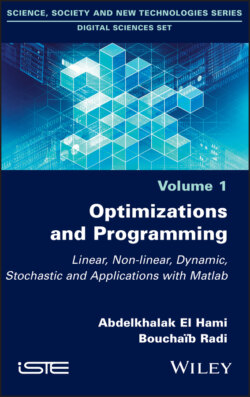Читать книгу Optimizations and Programming - Bouchaib Radi, Ghias Kharmanda, Michel Ledoux - Страница 28
1.6.3. Degeneracy and cycling
ОглавлениеSuppose that the current basic admissible solution is degenerate (i.e. at least one basic variable is zero), and let us recall a possible unfavorable scenario that can occur when the simplex algorithm is iterated. Performing a change of basis yields a value for the cost function that is greater than or equal to the previous value. The method is only guaranteed to converge if z* < z0; in fact, if the previous basic solution is degenerate, it might be the case that z* = z0.
If this phenomenon occurs multiple times over consecutive iterations, the algorithm can return to a basis that was already considered earlier. In other words, it returns to the same vertex twice. This is called cycling.
Although degeneracy is a frequently encountered phenomenon in linear programming, cycling is not. Some examples have been given in the literature [GAS 75]. Despite the rarity of cycling, it would be desirable to specify a method that avoids it and therefore guarantees that the simplex method will converge. There are several possible choices for a rule that avoids the inconvenience of cycling.
In the past, the most common technique was the so-called method of small perturbations. This method applies an infinitesimal geometric modification to the vector d in order to force it to be expressible as a linear combination of m vectors, with strictly positive coefficients in some basis. Each vertex is then defined as the intersection of n hyperplanes [HIL 90].
More recently, Bland [BLA 77] suggested modifying the rules for choosing the change of basis. Bland’s rule proceeds as follows:
– for the variable entering the basis, choose the smallest index j such that the reduced cost is negative;
– for the variable leaving the basis, if there is equality in θ*, choose the variable with the lowest index.
